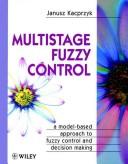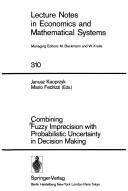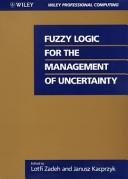| Listing 1 - 10 of 527 | << page >> |
Sort by
|
Book
ISBN: 3540889132 9786611960377 1281960373 3540889140 Year: 2009 Publisher: Berlin ; Heidelberg : Springer-Verlag,
Abstract | Keywords | Export | Availability | Bookmark
 Loading...
Loading...Choose an application
- Reference Manager
- EndNote
- RefWorks (Direct export to RefWorks)
This book is the proceedings of the Third Annual Conference on Fuzzy Information and Engineering (ACFIE2008) from Dec. 5-10, 2008 in Haikou, China. The Third Annual Conference on Fuzzy Information and Engineering (ACFIE2008), built on the success of previous conferences, the ACFIE2005 (Guangzhou, China), is a major symposium for scientists, engineers and practitioners in China to present their updated results, ideas, developments and applications in all areas of fuzzy information and engineering. It aims to strengthen relations between industry research laboratories and universities, and to create a primary symposium for world scientists. Each of the papers chosen from the 155 submissions has undergone a rigorous review process. Only high-quality papers in fuzzy fields are included such as: Fuzzy intelligence, neural networks and optimal; Fuzzy algebra; Fuzzy analysis; Fuzzy systems and logic; Fuzzy topology and measure; Fuzzy probability, control, forecasting and decision-making; Fuzzy clustering and fuzzy algorithms; Application in fuzzy sets; Rough sets and its application; etc.
Artificial intelligence --Congresses. --- Fuzzy logic --Congresses. --- Fuzzy sets --Congresses. --- Fuzzy systems --Congresses. --- Information technology --Congresses. --- Soft computing --Congresses. --- Soft computing --- Fuzzy systems --- Fuzzy sets --- Fuzzy logic --- Information technology --- Artificial intelligence --- Engineering & Applied Sciences --- Civil & Environmental Engineering --- Electrical & Computer Engineering --- Computer Science --- Information Technology --- Civil Engineering --- Applied Mathematics --- Mathematics. --- Artificial intelligence. --- Applied mathematics. --- Engineering mathematics. --- Applications of Mathematics. --- Appl.Mathematics/Computational Methods of Engineering. --- Artificial Intelligence (incl. Robotics). --- Engineering --- Engineering analysis --- Mathematical analysis --- AI (Artificial intelligence) --- Artificial thinking --- Electronic brains --- Intellectronics --- Intelligence, Artificial --- Intelligent machines --- Machine intelligence --- Thinking, Artificial --- Bionics --- Cognitive science --- Digital computer simulation --- Electronic data processing --- Logic machines --- Machine theory --- Self-organizing systems --- Simulation methods --- Fifth generation computers --- Neural computers --- Math --- Science --- Mathematics --- Mathematical and Computational Engineering. --- Artificial Intelligence.
Book
ISBN: 3642144632 9786613512093 1280006803 3642144640 Year: 2010 Publisher: Berlin : Springer,
Abstract | Keywords | Export | Availability | Bookmark
 Loading...
Loading...Choose an application
- Reference Manager
- EndNote
- RefWorks (Direct export to RefWorks)
This book is a continuation of the volumes providing various per-spectives on computational intelligence in healthcare [1-3]. This book is aimed to provide a sample of the state of art in the prac-tical applications of computational intelligence paradigms in health-care. It includes nineteen chapters on using various computational intelligent paradigms in healthcare such as intelligent agents and case-based reasoning. A number of applications and case studies are presented. This book is targeted towards scientists, application engineers, pro-fessors, health professionals, professors and students.
Engineering & Applied Sciences --- Computer Science --- Computational intelligence. --- Medicine --- Computational intelligence --- Data processing. --- Intelligence, Computational --- Computers in medicine --- Engineering. --- Health informatics. --- Artificial intelligence. --- Biomedical engineering. --- Computational Intelligence. --- Artificial Intelligence (incl. Robotics). --- Biomedical Engineering. --- Health Informatics. --- Artificial intelligence --- Soft computing --- Clinical engineering --- Medical engineering --- Bioengineering --- Biophysics --- Engineering --- AI (Artificial intelligence) --- Artificial thinking --- Electronic brains --- Intellectronics --- Intelligence, Artificial --- Intelligent machines --- Machine intelligence --- Thinking, Artificial --- Bionics --- Cognitive science --- Digital computer simulation --- Electronic data processing --- Logic machines --- Machine theory --- Self-organizing systems --- Simulation methods --- Fifth generation computers --- Neural computers --- Clinical informatics --- Health informatics --- Medical information science --- Information science --- Construction --- Industrial arts --- Technology --- Data processing --- Medical records --- Artificial Intelligence. --- Biomedical Engineering and Bioengineering. --- EHR systems --- EHR technology --- EHRs (Electronic health records) --- Electronic health records --- Electronic medical records --- EMR systems --- EMRs (Electronic medical records) --- Information storage and retrieval systems --- Medical care

ISBN: 047196347X 9780471963479 Year: 1997 Publisher: Chichester: Wiley,
Abstract | Keywords | Export | Availability | Bookmark
 Loading...
Loading...Choose an application
- Reference Manager
- EndNote
- RefWorks (Direct export to RefWorks)
Multistage Fuzzy Control a model-based approach to fuzzy control and decision making Fuzzy techniques are used to cope with imprecision in the control process. This authoritative book explains the essential principles of fuzzy logic and describes both the theoretical and practical advantages of the new model-based, prescriptive approach. Professor Kacprzyk offers a comprehensive and in depth examination of the issues underlying multistage control and decision analysis, addressing in particular fuzzy dynamic systems, fuzzy events, fuzzy probabilities and fuzzy quantifiers. The text also comprises an introduction to the basic concepts of fuzzy sets, fuzzy logic and fuzzy systems, complemented by real-world examples of the use of the model-based prescriptive approach to improve the efficiency of fuzzy control systems. Highly experienced in fuzzy control research, the author identifies new trends in the development of fuzzy sets and their direct application to decision-making processes. Fuzzy control engineers, researchers and postgraduate students will find this an ideal reference, offering a wealth of ideas for enhancing the performance of fuzzy control systems and equipping them with the tools to resolve genuine problems. Multistage Fuzzy Control is an essential handbook for those wishing to resolve real-world problems in control and decision analysis through the use of fuzzy-logic-based methods.
Book
ISBN: 8387674451 Year: 2002 Publisher: Warszawa : EXIT,
Abstract | Keywords | Export | Availability | Bookmark
 Loading...
Loading...Choose an application
- Reference Manager
- EndNote
- RefWorks (Direct export to RefWorks)
Book
Year: 1990 Publisher: Amsterdam: North-Holland,
Abstract | Keywords | Export | Availability | Bookmark
 Loading...
Loading...Choose an application
- Reference Manager
- EndNote
- RefWorks (Direct export to RefWorks)
Book
Abstract | Keywords | Export | Availability | Bookmark
 Loading...
Loading...Choose an application
- Reference Manager
- EndNote
- RefWorks (Direct export to RefWorks)

ISBN: 3540500057 0387500057 3642466443 Year: 1988 Volume: 310 Publisher: Berlin Springer
Abstract | Keywords | Export | Availability | Bookmark
 Loading...
Loading...Choose an application
- Reference Manager
- EndNote
- RefWorks (Direct export to RefWorks)
In the literature of decision analysis it is traditional to rely on the tools provided by probability theory to deal with problems in which uncertainty plays a substantive role. In recent years, however, it has become increasingly clear that uncertainty is a mul tifaceted concept in which some of the important facets do not lend themselves to analysis by probability-based methods. One such facet is that of fuzzy imprecision, which is associated with the use of fuzzy predicates exemplified by small, large, fast, near, likely, etc. To be more specific, consider a proposition such as "It is very unlikely that the price of oil will decline sharply in the near future," in which the italicized words play the role of fuzzy predicates. The question is: How can one express the mean ing of this proposition through the use of probability-based methods? If this cannot be done effectively in a probabilistic framework, then how can one employ the information provided by the proposition in question to bear on a decision relating to an investment in a company engaged in exploration and marketing of oil? As another example, consider a collection of rules of the form "If X is Ai then Y is B,," j = 1, . . . , n, in which X and Yare real-valued variables and Ai and Bi are fuzzy numbers exemplified by small, large, not very small, close to 5, etc.
Probability theory --- Statistical decision --- Fuzzy sets --- Uncertainty (Information theory) --- Prise de décision (Statistique) --- Ensembles flous --- Incertitude (Théorie de l'information) --- Management --- Business & Economics --- Management Theory --- 519.226 --- Decision problems --- Game theory --- Operations research --- Statistics --- Management science --- Sets, Fuzzy --- Fuzzy mathematics --- Set theory --- Inference and decision theory. Likelihood. Bayesian theory. Fiducial probability --- Fuzzy sets. --- Statistical decision. --- 519.226 Inference and decision theory. Likelihood. Bayesian theory. Fiducial probability --- Prise de décision (Statistique) --- Incertitude (Théorie de l'information)

ISBN: 0471547999 9780471547990 Year: 1992 Publisher: New York: Wiley,
Abstract | Keywords | Export | Availability | Bookmark
 Loading...
Loading...Choose an application
- Reference Manager
- EndNote
- RefWorks (Direct export to RefWorks)
Book
ISBN: 9783662435052 3662435047 9783662435045 3662435055 Year: 2015 Publisher: Berlin, Heidelberg : Springer Berlin Heidelberg : Imprint: Springer,
Abstract | Keywords | Export | Availability | Bookmark
 Loading...
Loading...Choose an application
- Reference Manager
- EndNote
- RefWorks (Direct export to RefWorks)
This is the first book covering the basics and the state of the art and important applications of the complete growing discipline of computational intelligence. This comprehensive handbook presents a unique synergy of various approaches and new qualities to be gained by using hybrid approaches, incl. inspirations from biology and living organisms and animate systems. The text is organized in 7 main parts foundations, fuzzy sets, rough sets, evolutionary computation, neural networks, swarm intelligence and hybrid computational intelligence systems.
Engineering. --- Computational Intelligence. --- Artificial Intelligence (incl. Robotics). --- Artificial intelligence. --- Ingénierie --- Intelligence artificielle --- Engineering & Applied Sciences --- Computer Science --- Computational intelligence. --- Intelligence, Computational --- Artificial intelligence --- Soft computing --- AI (Artificial intelligence) --- Artificial thinking --- Electronic brains --- Intellectronics --- Intelligence, Artificial --- Intelligent machines --- Machine intelligence --- Thinking, Artificial --- Bionics --- Cognitive science --- Digital computer simulation --- Electronic data processing --- Logic machines --- Machine theory --- Self-organizing systems --- Simulation methods --- Fifth generation computers --- Neural computers --- Construction --- Industrial arts --- Technology --- Artificial Intelligence.
Book
ISBN: 8385262075 9788385262077 3790805912 9783790805918 Year: 1992 Volume: 1 Publisher: Warsaw : Heidelberg : Omnitech ; Physica-Verlag,
Abstract | Keywords | Export | Availability | Bookmark
 Loading...
Loading...Choose an application
- Reference Manager
- EndNote
- RefWorks (Direct export to RefWorks)
Regression analysis --- Fuzzy sets --- Analyse de régression --- Ensembles flous --- Mathematical optimization --- Analyse de régression
| Listing 1 - 10 of 527 | << page >> |
Sort by
|

 Search
Search Feedback
Feedback About UniCat
About UniCat  Help
Help News
News